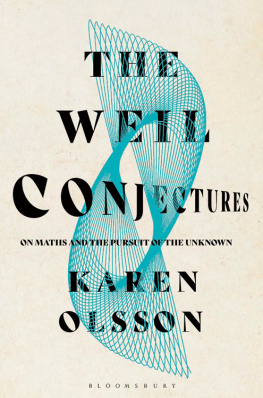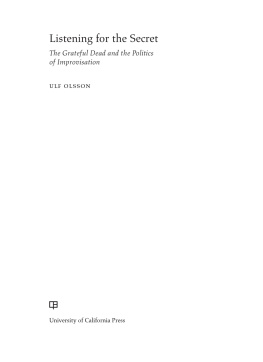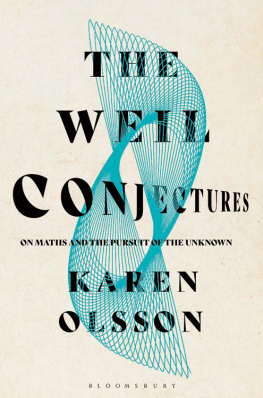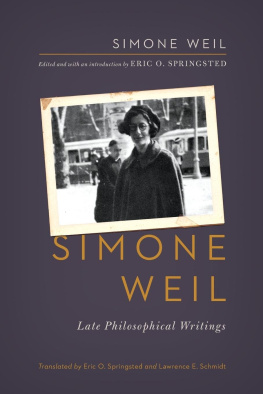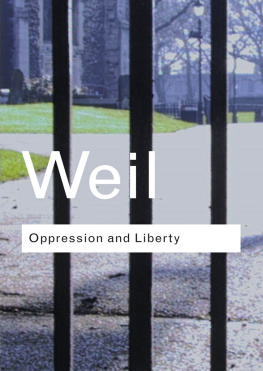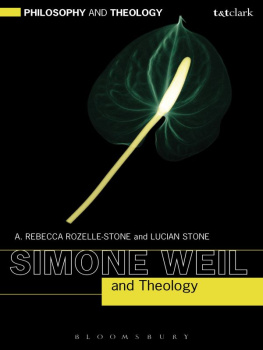
THE WEIL CONJECTURES
For Andrew
Waterloo
All the Houses

Small for her age, she takes up maybe a third of the operating table, from her folded-over socks to the crown of her head. Every so often a nurse places a towel soaked in chloroform over her nose and mouth. While the doctor cuts into her abdomen she babbles, sings Christmas songs, recites names from ancient legends. She seems not so much asleep as bewitched.
Its 1912. Simone is three.
With a snip and a pinch Dr. Goldmann fishes out her swollen appendix. We are not interested in luxury, the tiny patient announces, and the forceps nearly fall from his hands. As though shes been possessed by some restless soulthe things she says! Afterward he tells her mother that she is too extraordinary to go on living.
She recuperates in a drafty room in the hospital annex. Although her mother urges her to lie still under a pile of blankets, Simone makes a game of kicking off the covers and trying to wriggle out of bed. As a young woman, Selma had wanted to study medicine, but her father, Simones grandfather, forbade it, and instead she married a doctor, drew a magic circle around her family, and lavished herself upon them. Now Selma brings a basin to the bed so that Simone can wash her hands for the fourth time. Now she tries to pin down her daughter by telling her a story called Marie in Gold and Marie in Tar.
Once there was a girl named Marie who was sent by her stepmother into the forest to look for food. In the middle of the forest she came to a house, and there she heard a voice asking whether she would like to enter through a door of gold or a door of tar.
Tar is good enough for me, she said, and all at once she was showered with gold pieces. She brought them home to her stepmother, who promptly sent her own daughter, also named Marie, into the forest. This second Marie arrived at the same house and was asked the same question. She, however, picked the door of gold. As soon as she walked through it, she was deluged with tar.
I am left wondering whether the first Marie ever found any food.
Whether the second Marie died of asphyxiation.
At any rate, Simone would later say that the story had a profound influence on her. All her life, it seems, she went looking for tar doors.
Though the doctor couldnt have meant it literally when he judged her unfit for this life, he would be proved right. She was extraordinary, and at thirty-four she died a very strange deathan extraordinary death, the end product of her extraordinary manner of thinking and living.
Her older brother, Andr, is also extraordinary. A few years after Simones appendectomy, when hes about nine, he discovers an algebra book, its own kind of door. He races right through, enters a house full of equations, and begins to tinker with them, rearranging terms, expanding here, factoring there. Sometimes when he finishes a page of calculations hell hold it up above his face and admire the sheer density of what hes written, everything in alignment. The superscripts, the equals signs, the variables: x after x after x.
This worries his mother. We cant help but be a trifle annoyed and anxious, my husband and I, at the absorbing passion Andr shows for algebra, Selma writes in a letter. Some way or other he got hold of a book... and he is so happy that he has given up all play and spends hours immersed in his calculations.
A month earlier, hed been just as obsessed with croquet.
One day, coming down the stairs, he stumbles and falls. As he sits on the floor, clutching his knee, Simone, aged six, rushes to find his algebra book and then brings it to him, because shes sure its the thing that will comfort him most.
His parents try taking away his paper and pencil, so that he might spend more time outside, but soon they find him using a pebble to scratch equations into the sidewalk.

A head for numbers.
Episodes of graphomania turn up in biographies of other mathematicians; take for instance Archimedes, who, it is said, would rake the ashes out of a fire and draw shapes in them. Who after bathing and oiling himself would trace diagrams upon his skin with a fingernail.
Or Karl Weierstrass, who in the 1840s and 50s taught school by day and reimagined the field of mathematical analysis by night. Give him a pencil, said one of his sisters, and he might start to scribble his mathematics on any surfaceon wallpaper, on a shirt cuff.
Weierstrass would later write of the infinite emptiness and boredom of his years as a schoolteacher, before he achieved renown as a mathematician just shy of forty.
About his success he would say, Everything in life comes too late.
The scrape of the rock across the pavement as the boy works out his calculations. His delight as terms fall away and roots reveal themselves, as he begins to hang formulas and number relationships around the new rooms in his mind. He takes shelter there while autos throttle past and cannons fire in the distancethe country is at war. The family has followed Dr. Weil to Neufchteau, where he attends to soldiers wounded in battle and to victims of a typhoid epidemic. For the sick patients the preferred treatment is to plunge them into ice-cold baths. Most of them die.
Andr still plays with his sister, usually tutor to her pupil. He teaches her to read, delivers astronomy lectures on the bus. A know-it-all in short pants and a doll of a girl in a sailor dress, her hair in ringlets, egging him on with questions: oh, how they irritate the other passengers with their precocity! Something they dont yet know is that they are Jewish, since their parents have turned away from religion and never discuss it, but theres bound to be at least one old bigot on the bus who presumes by their appearance. Who huffs, I cant stand listening to children parrot things they dont understand.
Simone and Andr memorize long sections of verse by Corneille and Racine, and they recite them in turn, staring bug-eyed at each other. Its a contest: although they smirk as they call out the lines, every time one of them misses a word or mangles a phrase, the other delivers a hard slap to the face.
They look alike, an older boy version and a younger girl version of the same child, with abundant black hair and eyes full of dark intensity, hungry to know everything. Churning brains appended to small, floppy bodies. Theyll shout a phrase in ancient Greek and take off running. Or fall so deep into their novels as to forget lunch. Or cackle loudly at some joke that only they find funny, tumbling into each other, their laughter a pulse that bounces back and forth between them. Their mouths gaping, their noses practically touching: ha ha ha ha ha!
Or: from another room Selma will hear odd shuffling sounds, and when she comes in to investigate she finds them pinching, kicking, grabbing each other by the hair. Their faces have gone white with rage.
One winter, Andr decides that he is done with knee socks, he wants to tough it out bare-shinned, and, naturally, Simone follows his lead. Over their mothers protests they go sockless; worse, theyll board a bus with her and shiver theatrically and chatter their teeth and complain that their parents refuse to buy them socks. One day another passenger hurries out of the bus after them, points at Selma, and denounces her: You wretch!
Childrens games, but in adulthood, too, Simone would be eager to deprive herself, to go without heat, food, sleep. And an inner voice would lash at her,
Next page
